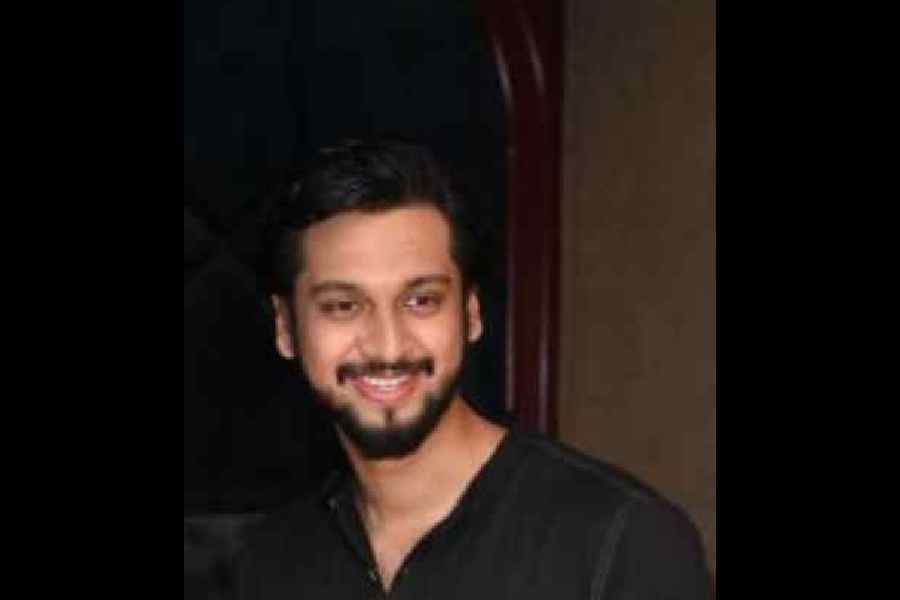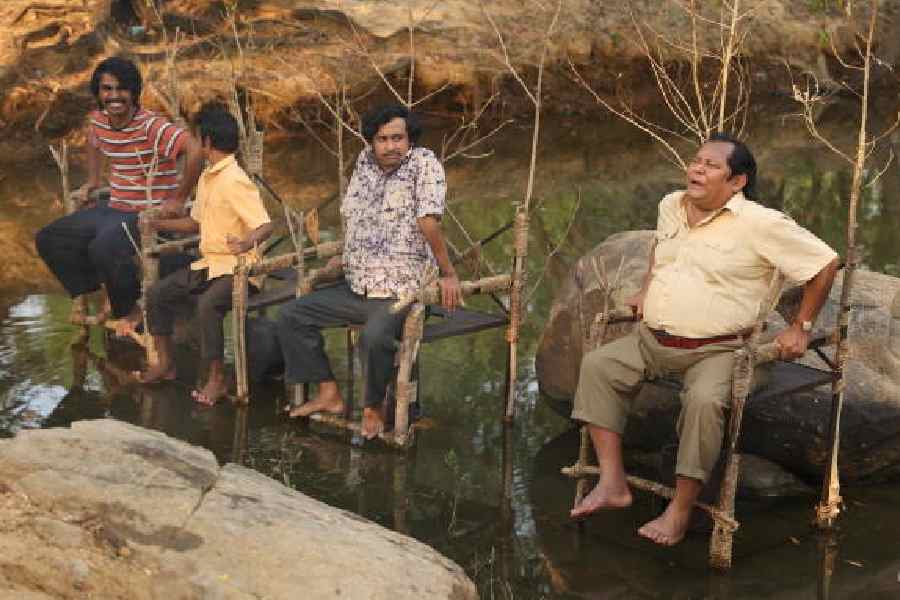Sometimes the most effective balm for your aches is giddy, unhinged laughter. The kind that makes you grunt like an overfed pig, makes your nose crinkle and has you massaging your stomach to ease the ab cramps you’d rather have at the gym. The kind of laughter that makes you ask yourself: “Why am I laughing at a fart joke?” If that’s your pick for the day, Dhrubo Banerjee’s Bogla Mama Jug Jug Jiyo is ready to tickle.
In 1928, when Walt Disney released Steamboat Willie, the first animated talkie featuring Mickey Mouse, enthusiasts instantly realised the debt Disney owed to Charlie Chaplin’s The Tramp. Expressive, clumsy body language, deliberately pronounced effects, slips, slaps, and falls, all condensing into what we identify as slapstick. Even now, comedy-in-bold has its roots firmly embedded in styles both real and cartoonish. Similarly, Bogla Mama... derives much of its flavour from another era, and the antiquated, yet thriving culture of raw entertainment.
Dancing to Indraadip Dasgupta’s puckish theme, the opening title invites us into a comic book in motion, one that pays homage to the worlds of Nonte Fonte and Hnada Bhnoda. Thus begins the story of the uncle who refuses to grow up and acknowledge the passage of time — a trope that has historically been endearing. Setting Raj Kumar Moitra’s literary creation Bogola Mama... aside, think about all the hours Teni-da has to spare for narrating absurd stories to his idiosyncratic teenage disciples. Like Bnatul’s, Bogla’s world has its own sense of undisturbed time — for the lack of modernity and the more complex ambitions it churns. In fact, time does not matter, just as if the town of Gomoh were a glittering reflection of R.K. Narayan’s sleepy Malgudi.
Therefore, we see a lot happening in Bogla Mama..., but also nothing happening at the same time. As a writer myself, I would consider it to be quite the gamble, with statistical market research on the audience’s plummeting attention spans being constantly cited to warn makers. But then again, one of the most successful TV shows of all time, NBC’s Seinfeld was pitched as “a show about nothing”. The “nothingness”, especially in the first half of Bogla Mama..., seems intentional in its design. A couple of mature, and surely employable, boys whiling away their afternoons stealing eggs from under a hen, or rehearsing for their performance with no particular haste or essential skill, outlines the carefree lethargy of small-town life in post-Independence Bengal of the ’70s and ’80s.
The squadron of 20-somethings effortlessly fit into Bogla Mama’s planet of no work and only play. Seasoned performers as they already are, Riddhi Sen (Kebu) and Ditipriya Roy (Madhuja) notably hold their ground without indulging in party tricks characteristic of this genre. Though written as the spotlight of the young brigade, they remarkably withhold themselves, and seamlessly integrate Kebu and Madhuja’s private moments within the dynamics of the group, knowing fully well that their brewing romance was not a highlighted plot point in itself. They do not succumb to the performer’s awareness that “I am a leader of this pack”, and upset the equilibrium of any scene. Barring slight mishaps with the Bangal accent, the entire “Hula Bila” jing-bang lot is commendably tuned to scale — a little quartet that knows their cues and quirks, clearly both on and off the screen.
Flawlessly hilarious, nuanced
Now, I come to the veterans — most of whom I had the privilege of acting with in my debut film. Aparajita Adhya, as Bogla’s “heroine”, is graceful and assertive. Koushik Sen (Mejka) is flawlessly hilarious and is thoroughly nuanced while portraying the turmoils of his family dynamics and his unrequited love. He is one of the few actors who possesses the power to progress a narrative with the slightest raise of an eyebrow. Biswanath Basu, as the crackpot scientist, and Reshmi Sen as a doting mother figure, play their parts committedly, enough to make you miss their involvement in the core events. Moreover, after a triumphant trip to a certain haunted mansion in 2022, Sandip Bhattacharya as the Mastermoshai returns with a “capital” performance.
Finally, plaudits must be given to two men — the two who stood by me in almost all my first scenes as an actor. More pertinently, two men who’ve been, often unimaginatively, cast in the same mould — the funnyman Kharaj Mukherjee, and the villain Rajatava Dutta — for years. As two extremely capable actors, I’m certain they strategise, the night before every shoot, ways to make their next role unique and memorable. With the aid of their adept improvisations, and neat characterisation achieved by the makers, both are match-winners in Bogla Mama..., yet again gifting us fresh iterations of their usual screen selves.
Kharaj Mukherjee has clearly built an unchallenged podium for himself. Expectedly, he lives and breathes Bogla, living up to his decades-long reputation as Bengali cinema’s loud, frivolous uncle. However, Mukherjee shines the brightest in his reactions from the wings, and his scenes of catharsis, where Bogla figuratively takes his clown mask off and purges his insecurities — importantly regarding his body, and then, his failed theatre career. Dhrubo Banerjee guarantees that we root for Bogla — the portly, immature, neglected underdog. With the perfect casting of the protagonist, Bogla Mama... sails.

It is not the first time that Rajatava Dutta is playing an antagonist. It is also not the first time he is playing a despicable criminal who also makes you chortle. In fact, he did so in the latest Guptodhan film itself. Again, Banerjee repeats his successful formula with the tyrannical, yet utterly soft Felu Acharya — this time, giving Dutta’s character the best character backstory and arc of maturation. And, the actor acknowledges and fully utilises that space, making Rajatava’s act stand out from the madding crowd. In fact, Felu’s deep-seated humiliation for not being “cultured” enough is a crisis that emblematises the film’s motives. He has the last laugh, as I personally witnessed a “cultured” theatre audience at the premiere show pixelate into blocks of giggles and disgraceful laughter while spectating an utterly nonsensical and subversive play on screen.
By now, this tiny tinsel town surely suspects that Banerjee is a filmmaker privy to a secret recipe for commercial success. After a stellar, unblemished track record with his Guptodhan franchise with SVF, Banerjee’s foray into old-world, in-yer-face comedy was quite the detour. Yet, the fact that he truly boasts the acumen to presage the elusive answer to “what works” is evident in the second half of Bogla Mama... — 30 minutes of riotous mayhem, that for me, seals the film.
In an absolute comedy of performative, textual, and gastrointestinal errors, the much-awaited staging of Bogla’s play is relentless in its effort to entertain. Unabashed in her intentions, the writer, Sreejib Ganguli, crafted the sequence knowing fully well that despite all our cultural highbrow, Bengalis, like most “intellectual” communities, still have their funny bones tickled the hardest by an upset stomach.
Bogla Mama... has been skillfully made with two contrasting approaches in two very different halves — the first half is of digestion, and the second half is, pardon my French, one of uncontrolled release. The first hour offers an exposition of a mundane, timeless, peculiar life, and the second, of how that very quirky yet stable universe is topsy-turvied, and has its intestines knotted.
In the end, we are charmed into believing that honesty — in failure, in love, in jokes, and in embarrassment — is all that it takes to hold onto a smile. If you’re looking for an innocent and rambunctious reminder, Bogla Mama..., is a licensed antacid, available at your nearest theatres, with an instant distraction from all things scary, serious, and true. Straight from the gut, to the gut, and out.











